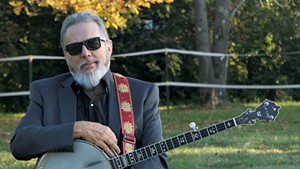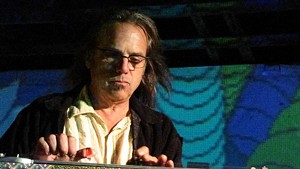
I am sitting on the outdoor deck of a popular Burlington restaurant overlooking an increasingly windswept Lake Champlain. To my left sits Gordon Stone, the legendary local banjo and pedal-steel player. To my right sits his wife and longtime manager, Jen Harwood. I enthusiastically congratulate Stone on his latest album, Nightshade, which will be released this week. Sipping a nonalcoholic beer as a fierce gust whips off the lake, he seems almost uncomfortable when confronted with my effusive but genuine praise. For a man of his near unparalleled talents, his modesty strikes me as funny. I think that if I were anywhere near as skilled at anything as he is on either of his chosen instruments, I would be an insufferable ass. But I’m not — as talented, anyway. And honestly, I should have predicted his response.
I have known Gordon Stone for several years now. In the interest of full disclosure, I’ve shared the stage with him on numerous occasions. Some years back, he even agreed to appear on my old band’s debut full length, and took far less money than his time or skills were worth — and that’s not even considering the PR value of having Gordon-freaking-Stone play on your album. So take this next sentence with the appropriate shaker of salt: Nightshade is excellent, perhaps profoundly so. But the last person in the world to whom I would need to say that is Gordon Stone. He knows it’s good.
Case in point, during our recording sessions together years ago, Stone unleashed a series of jaw-dropping pedal-steel licks over one of our tunes. By all accounts, as a band we were ready to move on to the next cut, thanking him profusely for his time. Much as he did when I assaulted him with praise about Nightshade, he simply sat there nodding, a wry (nervous?) smile creasing the corners of his lips. He then looked up and said quite matter-of-factly, “Yeah. Unless, of course, you want something good.” He then proceeded to one-up himself by a country mile. I’m guessing the boys from Phish might have some similar Gordon Stone stories.
Stone’s savant-ish modesty aside, the fact remains that Nightshade is a remarkable album. And it’s not just the superior quality of playing, which we have all come to take for granted. Nor is it merely the attention to detail in the arrangements that have become a hallmark of his work. Or even the cavalcade of stars gracing the album — Page McConnell, John McCartan, Erik Lawrence, etc. It is all of those things and none of them.
What truly stands out beyond even those “take it to the bank”-type accolades is the sheer diversity of music found within the album’s 10 tracks. Stone has always cast a wide net. But here he seems to have pushed himself beyond his own far-ranging boundaries, displaying a versatility that surprises, even if, at this point, it probably shouldn’t. From the slinky, almost spy jam of the opening title track and the marching Afro-funk found on “Snakehouse,” to the sparse, efficient beauty of the solo banjo interlude “Jelly Cake Rag” and the boozy intensity of roadhouse rocker “Stone’s Throw,” Gordon Stone continues to find new ways to explore the outer limits of his instruments.
But the most intriguing aspect of Nightshade is that many of its finer moments actually have little to do with him. Stone introduces a trio of West African players living in Vermont: Modou Ndione (balaphone), Pape Ba (djembe) and Papiss (djoun-djoun). As Harwood points out, most of the African influence we hear in the Green Mountains comes from outside our borders. But this time around, she says, “It’s coming from the inside out.”
Ndione is perhaps the most striking find, though Ba and Papiss add dynamic, pulsing rhythms alongside drummer Caleb Bronz’s set work. But the balaphone’s short, punctuated tones — think hail striking a tin roof — provide a striking sonic contrast to the languid strains of Stone’s steel. Especially on eerie, meter-less closing track “Kaki Lambe” (rough translation: “Mask of the Devil”), the hollow notes of Ndione’s balaphone are downright creepy.
A cynic might point to Stone’s contemporary and friend Bela Fleck’s recent explorations with Malian kora master Toumani Diabate and wonder whether Stone is merely following in the fellow banjo great’s footsteps. He’s not. Though Harwood candidly admits frustration at the timing of each player’s forays into African music, both she and Stone seem tickled at the continued concurrence of their careers. It’s certainly not the first time these giants have crossed paths.
“I just find it amazing that, independently of one another, the two premier banjo players in the world continue to grow in the same way,” Harwood says. “It’s the evolution of the instrument.”
Harwood is correct, of course. But more acutely, it is also the evolution of Gordon Stone. And as Nightshade reveals, it is a fascinating evolution to behold.












Comments
Comments are closed.
From 2014-2020, Seven Days allowed readers to comment on all stories posted on our website. While we've appreciated the suggestions and insights, right now Seven Days is prioritizing our core mission — producing high-quality, responsible local journalism — over moderating online debates between readers.
To criticize, correct or praise our reporting, please send us a letter to the editor or send us a tip. We’ll check it out and report the results.
Online comments may return when we have better tech tools for managing them. Thanks for reading.